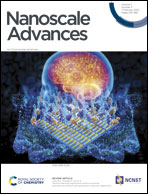Facile synthesis of defect-rich RuCu nanoflowers for efficient hydrogen evolution reaction in alkaline media†
Abstract
Developing high-performance electrocatalysts toward hydrogen evolution reaction (HER) in alkaline media is highly desirable for industrial applications in the field of water splitting but is still challenging. Herein, we successfully synthesized RuCu nanoflowers (NFs) with tunable atomic ratios using a facile wet chemistry method. The Ru3Cu NFs need only 55 mV to achieve a current density of 10 mA cm−2, which shows ideal durability with only 4 mV decay after 2000 cycles, largely outperforming the catalytic properties of commercial Pt/C. The Ru3Cu NFs comprise many nanosheets that can provide more active sites for HER. In addition, the introduction of Cu can modulate the electronic structure of Ru, facilitate water dissociation, and optimize H adsorption/desorption ability. Thus, the flower-like structure together with the proper incorporation of Cu boosts HER performance.



 Please wait while we load your content...
Please wait while we load your content...